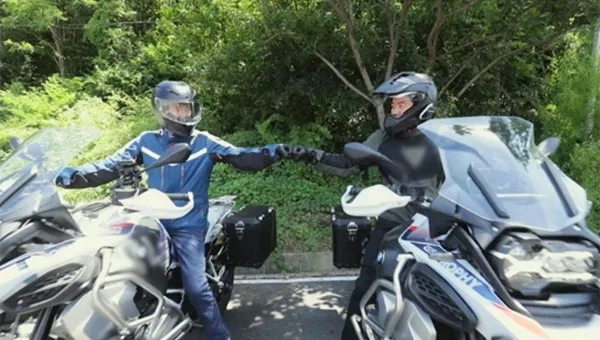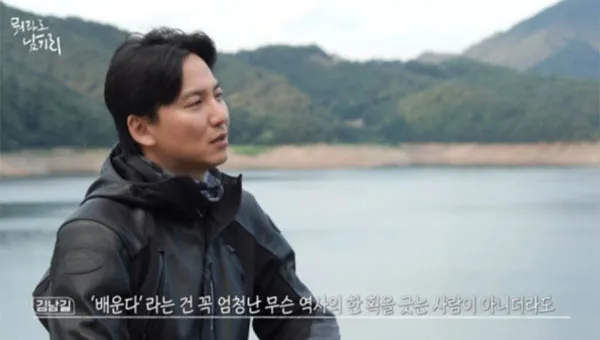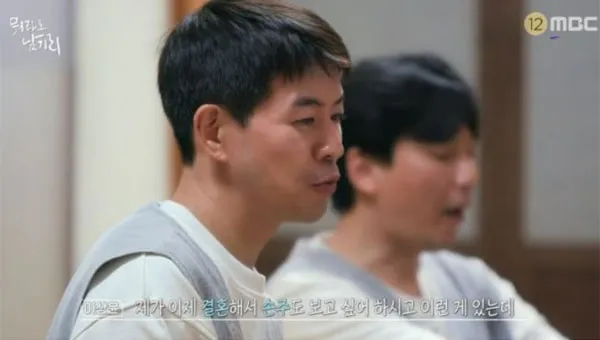Kim Nam-gil and Lee Sang-yoon’s path is too disappointing to end like this (‘I’ll Leave Something Behind’)

[Enter Media = Jeong Deok-hyun] Kim Nam-gil and Lee Sang-yoon went out on a motorcycle. And you meet people on the road. Those people are people who have found a new path outside the path everyone else walks. Kim Nam-gil and Sang-yoon Lee ask them the questions of those who have lost their way while living in the city. There is no correct answer, but those who stand on a different path outside the same path provide answers through their lives themselves. This is the world captured in MBC’s four-part documentary ‘I Will Leave Anything’.
Kim Sang-jun, a postman who has been delivering letters and goods to Bisugumi Village in Gangwon-do, which is blocked by water, for 21 years, told a story about the hardships he endured as a child. “My father didn’t work well when he was young. So we had to work from an early age. I learned how to carry a burden when I was ten years old. My great-uncle lived with me across the river, and he just gave me a burden. “They hang it according to your height, and they ask you to hang it and follow me. They say I’m the one who can hold on to carrying it.”
Kim Nam-gil asks 19-year-old Kim Ha-ye-rin a question on his behalf. “When you become an adult, with what mindset should you take responsibility for your own life?” Postman Kim Sang-jun pondered for a moment, saying, “What can I say?” before opening his mouth. “I think it helps people survive once they are born. People thrive when they are young, and people thrive when they grow up. People like that don’t know what kind of life we live. They live their own lives. “It’s a living, and we’re born to work, so let’s do our best in what we do. Don’t hurt anyone and just do the best we can with what we’re in charge of…”

His words, “Let’s do our best,” are powerful even though they are not great rhetoric. It is not just words, it is the heart of the people who traveled this waterway to and from isolated villages for 21 years. No, it’s because he has the heart to bear the burden and endure for the livelihood of his family since he was ten years old. To the questioner who asked about the mind of an adult, these words, delivered not by someone else but by postman Kim Sang-jun, carry a different weight.
On behalf of Lee Sang-yoon, 27-year-old Kwon Ji-soo asks Yang Chang-mo, a doctor who visits remote areas of Gangwon-do to take care of the physically challenged elderly, asking, “Is your worry about not having a dream?”After thinking for a while, Yang Chang-mo cautiously opened his mouth. “I also lived a dreamless life until my late 30s. The reason I’ve been doing this for 4 years now is because I lost my way 4 years ago, so I found this path. To find your way, you have to go through the process of getting lost. It’s necessary. But losing one’s way takes some courage. If we want to catch something, we have to let go of what we were holding on to before we can catch it. This person says he doesn’t have a dream, but that’s a process. I think it’s okay.”
Park Jeong-heon, a climber we met at Jiri Mountain, had both his fingers cut off and blunt for some reason. He succeeded in climbing the North Face of Cholatse in the Himalayas with his junior Choi Kang-sik, but on the way down, he fell into a crevasse and fought for five days with broken ribs with a rope attached to the junior. Although he eventually survived, he had to have eight fingers amputated due to severe frostbite. He said he didn’t wear short sleeves for two years because he didn’t want to show the scars on his hands, and it took him 10 years to climb the mountain again. Although he was unable to climb, he did not stop taking on challenges in other ways, such as crossing the east and west Himalayas by paragliding and traversing 6,600 kilometers from the Himalayas to India by skiing, kayaking, biking, and trekking.

24-year-old Kim Bo-eun asked him a question. After repeatedly failing to find a job, he asked, “Is it too late to change careers at the age of 24?” he answered. “The most precious time in my life was those two years of pain. Because of that time, I was able to stand again, so in a way, pain is just a frustration, and depending on how I accept it, my recovery is faster. I am 24 years old. is so beautiful. Even failure is beautiful. So I think what I want to say to this friend is to try to fail more.”He used to think falling from a mountain was unacceptable, but he says he changed his mind after the incident. Falling is also a part of life.
‘Leave Anything’ is a title named after actor Kim Nam-gil, but the format itself makes it a documentary that feels stripped-down. Kim Nam-gil and Lee Sang-yoon go on a bike ride together, meeting people and talking, vaguely believing that there will be something worth leaving behind. However, strangely enough, this documentary leaves a deeper impression than a tightly packed documentary. It’s almost like a reverberation created by the empty space. For those of us who are filled with everything or are always exposed to stimulating things, the space afforded by the word ‘anything’ is all the more precious.
‘I Will Leave Anything’ ended with four parts. These days, not only dramas and entertainment shows, but also documentaries are often harsh and provocative. In it, this documentary seems to be taking a completely different path, like the postman in Bisugumi village or the doctor visiting remote areas of Gangwon-do. That’s why it’s even more disappointing that this documentary ends with only four parts. I hope there is at least a documentary that shows through people walking that path that there is another path that goes at walking speed when everyone else is running. This is why I feel like I want to come back and leave something behind, even if it’s just for the season.
Columnist Jeong Deok-hyun thekian1@entermedia.co.kr
[Photo=MBC]
- “It’s different from existing daily dramas”… Confidence of ‘Without blood and tears’ [Comprehensive]
- Is only the appearance surreal?…Song Kang sheds ‘controversy over acting ability’ [MK Star]
- ‘Without blood and tears’ Oh Chang-seok and Lee So-yeon “We are the same age in 1982, we can look forward to working together.” [Synthesis]
- Lee So-yeon “‘Without blood and tears’ It’s different from the existing KBS daily dramas… Humor and family love”

![Angelina Jolie’s daughter Shiloh turns 18, “Should I go to college or turn professional?” [Overseas Issue]](https://cdn.rubensays.com/wp-content/uploads/2024/01/20240122140656473twpp-1-64x64.webp)

![‘Idol Pick’ Kang Daniel, the idol who looks good with this year’s color ‘Peach Fuzz’ [DA:Chart]](https://cdn.rubensays.com/wp-content/uploads/2024/01/20240122140521443iwgv-1-64x64.webp)

![Jo Se-ho, his thoughts on his relationship, “I have found someone precious, and I want to be with them for a long time.” [specialty]](https://cdn.rubensays.com/wp-content/uploads/2024/01/20240122122249645unhk-1-64x64.webp)
![‘Touch Me’ Samantha Fox, drunk at the highest level ever… Delayed takeoff of plane, causing damage to passengers [Hollywood News]](https://cdn.rubensays.com/wp-content/uploads/2024/01/20240122122006709cknb-1-64x64.webp)
![‘Without blood or tears’ Lee So-yeon and Ha Yeon-joo, sisters who met through their father-in-law…a bloody and cruel narrative [Comprehensive]](https://cdn.rubensays.com/wp-content/uploads/2024/01/20240122121517416hzaz-1-64x64.webp)
![Kim Kardashian and Kanye West meet for children after divorce… Breathtaking atmosphere [Hollywood News]](https://cdn.rubensays.com/wp-content/uploads/2024/01/20240122121434539eczd-1-64x64.webp)
![“It’s different from existing daily dramas”… Confidence of ‘Without blood and tears’ [Comprehensive]](https://cdn.rubensays.com/wp-content/uploads/2024/01/20240122121413487wcqb-1-64x64.webp)
Leave a Reply